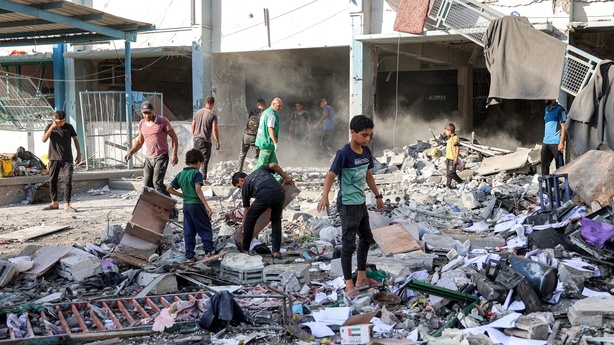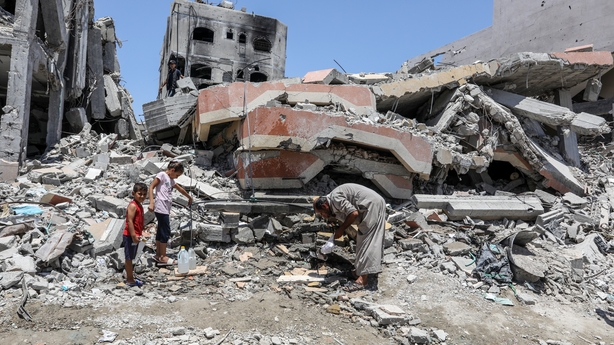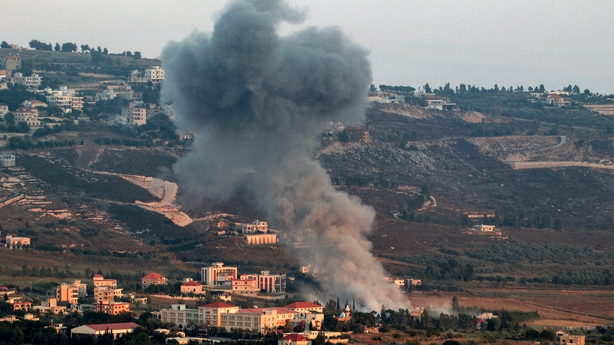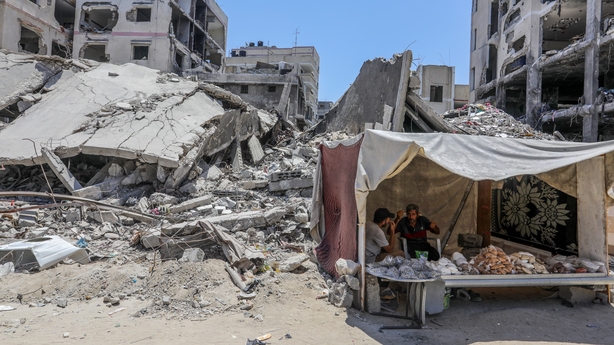The leader of the Palestinian militant group Hamas has said that any deal that does not guarantee a ceasefire and an end to Israel's offensive in Gaza is "not an agreement".
Ismail Haniyeh said: "If [Israel] thinks targeting my family will change our position or that of the resistance, they are delusional".
He issued the statement following the death of his sister in an Israeli air strike on the home of his extended family in Shati in Gaza City, one of eight historic refugee camps in the territory.
Ten people were killed, including Haniyeh's sister and other relatives, family members and health officials said.
Hassan Kaskin, a neighbour, said the house was hit without advance warning before dawn today. Footage showed the multi-floor building reduced to rubble.
Haniyeh, who leads Hamas' diplomacy and is the public face of the group that has run Gaza since 2007, is based in Qatar.
He has lost many relatives in Israeli airstrikes since the war began on 7 October, including three sons.
Israel's military said its forces had targeted militants overnight in Gaza City who had been involved in the planning of attacks on Israel.
The fighters, it said, included some who had seized hostages as they took part in the Hamas-led cross-border attack on Israel last October.
The Israeli Air Force bombed two structures "used by Hamas terrorists in Shati and Daraj Tuffah in the northern Gaza Strip. The terrorists operated inside school compounds that were used by Hamas as a shield for its terrorist activities", the military said in a statement.
Hamas denies using civilian facilities such as schools and hospitals for military purposes.
The group described the attacks on the two schools and the house in Shati camp as "massacres".
Elsewhere, at least 14 people were killed in two Israeli air strikes hit two schools in Gaza City, medics said.
Israeli tanks also pressed deeper into western areas of Rafah in the enclave's south, blowing up homes, residents said.
Separately, the armed wings of Hamas and the allied Islamic Jihad said in a joint statement that their fighters had fired mortar bombs overnight against Israeli forces in the Yibna neighbourhood of eastern Rafah.
In the city of Khan Younis to Rafah's north, medics said Israeli tank shelling killed seven Palestinians and wounded several other people at a tent camp in a western district.
Gaza health officials said at least 45 Palestinians had died in Israeli military strikes across the densely populated coastal enclave today.

The United Nations Palestinian refugee agency (UNRWA) said chaos is taking hold in Gaza as smuggling bands form, adding to the difficulties of delivering sorely needed aid to the Israeli-besieged territory.
A high risk of famine also persists as the conflict rages on unabated and humanitarian access remains restricted, a global hunger monitor said.

Over eight months into the war, international mediation backed by the United States has failed to yield a ceasefire agreement.
Hamas has said that any deal must bring an end to the war and full Israeli withdrawal from Gaza, while Israel says it will accept only temporary pauses in fighting until Hamas is eradicated.
Israeli Prime Minister Benjamin Netanyahu said on Sunday that the phase of intense fighting against Hamas would end "very soon", freeing up more forces for deployment on the country's northern border with Lebanon, where clashes with Iran-backed Hezbollah have escalated.
Israel's national security adviser Tzachi Hanegbi said that it would spend the coming weeks trying to resolve the conflict with Hezbollah and would prefer a diplomatic solution there.
Shelling has led to the evacuation of tens of thousands of people on both sides of the Israel-Lebanon border.

Israel's ground and air campaign in Gaza was triggered when Hamas-led militants stormed into southern Israel on 7 October, killing around 1,200 people and seizing more than 250 hostages, according to Israeli tallies.
The Israeli offensive in retaliation has killed 37,658 people, according to Gaza's health ministry, and has left the tiny, heavily built-up territory in ruins.

Since last month, ground fighting has focused on Rafah, next to Egypt on Gaza's southern edge, where around half of the enclave's 2.3 million people had been sheltering after fleeing other areas. Most have since had to move again.
Gaza's health ministry said that hospitals and medical centres in the territory are experiencing a severe shortage of medicines and other supplies due to the continued offensive, Israel's control and closure of all crossings and its targeting of the health sector in Gaza.
In particularly short supply are medications needed for emergency, anaesthesia, intensive care and operations, the ministry said in a statement.

